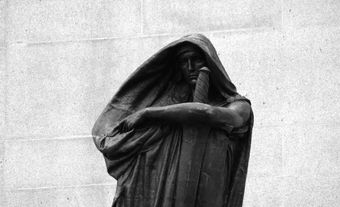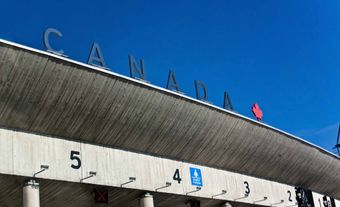This article was originally published in Maclean's Magazine on April 25, 2005
Explosive Testimony at Gomery Inquiry
FINALLY, THERE CAME A MOMENT when it was raining tax dollars so hard in Quebec that even a resourceful man started running out of buckets to catch them. So in 1999 and again in 2002, Luc Lemay tried something new: he attempted to give some of the money back.
Perhaps it should come as more of a surprise than it did last week to learn that the federal government wouldn't let him.
Lemay was the first of two white-haired, soft-spoken fellows who testified before the Gomery inquiry in Montreal last week. Jacques Corriveau, the graphics designer and sometime friend of Jean CHRÉTIEN, was the second. A parade of witnesses has testified that Corriveau knew all the right people and all the smart angles when it came to getting some of the astonishing largesse from the federal sponsorship program. But today he asserts a woeful failure of memory, the bitter fruit of age and failing health.
Lemay was in publishing and trade shows. The sponsorship program made him quite rich. The blend of acuity and naïveté he brought to the witness stand was almost a mirror image of Corriveau's: Lemay's memory is actually quite acute, but during the period that lately occupies the attention of Justice John Gomery and most of Canada's political class, Lemay seems to have operated in a state of almost childlike innocence.
One couldn't escape the impression his incuriosity was wilful. Faced with a succession of taxpayer-funded and highly lucrative gift horses, Lemay thought better of looking any of them in the mouth.
The rain of tax money started to fall on Lemay in 1997. He hired Corriveau, for $125,000, to do some design and layout work for a big outdoor-life trade show at Montreal's Olympic Stadium. One day, more or less out of nowhere, Corriveau told him he'd found $400,000 from the federal government. Corriveau didn't say what part of the government. Quickly establishing a trend, Lemay decided not to ask. "I interpreted it as a subsidy," he told Gomery's lead counsel, Bernard Roy. Gomery interjected: "Or you won the lottery? Because it practically fell from the heavens, didn't it?" "Indeed," Lemay said. He briefly searched for something similarly clever to say, before settling for: "We were very happy."
He hardly knew from happy yet. He would learn. Over the next five years, Lemay raked $36.5 million in federal sponsorship money into Groupe Polygone, his magazine and almanac publishing company, and Expour, his trade-show firm. For this handsome benefit from Corriveau's Ottawa connections, Lemay paid Corriveau's Pluri Design outfit a total of $6.7 million in commissions.
Right away, unhelpful questions would have arisen if Lemay had been the nosy sort. The word for somebody who uses Ottawa connections to seek business benefits for clients is "lobbyist." But lobbyists must register and have their work tightly regulated. Corriveau had done none of that. So they agreed that Corriveau would bill for services, and that it would be a happy coincidence if the "services" always added up to 17.5 per cent of any federal sponsorship contract Lemay won.
I hose you with taxpayer dollars, you hose me with taxpayer dollars. Who could complain? Incuriosity having proven such a profitable state of mind, Lemay wasted no time transforming himself into a regular Sergeant Shultz. He saw nothing. He heard nothing. He paid the bills Corriveau sent him without even looking at them. Sometimes he paid, on Corriveau's word that money was due, without even noticing that Corriveau hadn't sent any sort of bill.
So Lemay's eyebrows never went up when Corriveau billed him for an impressive series of trade shows in the spring of 2000, in a picturesque string of smallish Quebec towns: Rimouski, Trois-Rivières, Sherbrooke, Ste-Foy. Each time, according to Corriveau's identical bills, for shows which "will take place ... at the Olympic Stadium."
None of the towns in question has ever had an Olympic stadium. "Perhaps one day," Gomery said. Circumstances have lately given the judge several opportunities a day to hone his already keen ear for a darkly funny punchline.
Sometimes Gomery simply took over the interrogation from Roy. "But you're a businessman, Mr. Lemay?" he asked on Wednesday, in his extraordinarily fluent but heavily anglo-accented French. "I have a hard time believing you simply accepted any bill for any amount - without ever verifying whether the amount paid by Polygone and Expour wasn't about 17.5 per cent. Did you check that occasionally?"
No, Lemay said. "Then," Gomery said, "you're not the businessman I thought."
But here, if I may, is precisely where Gomery misunderstands the peculiar logic that reigned at the time. Lemay was getting rich by not asking. Corriveau's minimalist billing practices were simply the cost of keeping the golden goose alive. It was asking that would get everyone in trouble. At the time, Lemay had this on the highest authority: the Ottawa bureaucrats from whom all tax dollars flowed.
For a while, this whole lucrative business seemed to rest on a bedrock principle of common sense: for the federal government to wave the Canadian flag in the trade-show business, there had to be trade shows. The amount of money on offer seemed almost endless and the billing was lax at best, but there had to be some anchor in the real world. Even the "Olympic Stadium" spring 2000 tour of small-town Quebec had one toe in the realm of reality: the shows in question did take place, albeit not in Olympic stadiums.
But twice, the events that were to serve as the basis for this festival of back-scratching had to be cancelled outright. That's when things really got weird.
Lemay was paid $333,000 for an outdoor-life-and-snowmobiling show in Quebec City in 1999. But he had to cancel the show. Businesses didn't want to buy space because there wasn't enough parking at the venue. Lemay explained to Chuck Guité, the federal Public Works bureaucrat now at the centre of the sponsorship controversy, that he'd have to give the federal money back.
"Listen, it's out of the question," Guité told him. "You should put more visibility" - Maple Leaf flags, Canada banners and so on - "in other sponsored events." In the end, Lemay had a lot of trouble finding other events to spend $333,000 on. But until Ralph Goodale tried to start cleaning up the mess, as Jean Chrétien's public works minister in 2002, nobody in Ottawa ever asked where the money had gone.
Then an even bigger event was cancelled: a farm-machinery show at the Olympic Stadium - the one that actually exists, in Montreal - in 2000. Lemay landed $508,000 in sponsorship money for that one. Then, as happens with disconcerting regularity, the stadium's roof tore and it became unusable for a while.
Off goes Luc Lemay to Guité's successor at Public Works, Pierre Tremblay. And again, Tremblay was horrified at the prospect of taking taxpayers' money back once the use for it, however tenuous, had vanished altogether. The moment when Lemay described what happened next was one of the most darkly comic of a tremendously entertaining week at the Gomery show.
"Listen," Lemay recalled Tremblay telling him when he raised the issue of reimbursement, "if you do that you're going to get me in ..." Lemay stopped himself. "I won't say the word."
"In the torn roof?" Roy offered.
"Exactly," Lemay said, relieved.
Gomery joined the fun. "On the farm, we say 'In the mud.' "
"In the mud," Lemay agreed. "In chocolate, if you like."
Once again, Lemay was told to spread the money around into other events. Once again it wasn't easy: it was a lot of money. Once again, the feds left him mercifully untroubled with nagging questions about where the half-million had landed.
What none of this exchange answers - although, in a way, it gets to the heart of what Gomery will try to establish during the last six weeks of public hearings - is why a senior federal bureaucrat would have been up to his ankles in mud or chocolate for taking back money when there was no longer any pretext for spending it.
Gomery has heard, mostly from Groupaction president Jean Brault during his own briefly embargoed testimony earlier this month, that a good deal of the money found its way into LIBERAL PARTY of Canada coffers. Last week, there was no such "smoking gun" moment, and much of what Brault asserted was contradicted by other witnesses.
But there have been tantalizing hints. In his testimony on Monday, Alain Renaud, a Liberal fundraiser and so-called "door opener," was describing a visit to Corriveau's office. Now, Corriveau made an awful lot of money off the feds - tens of millions by his own account. So I suspect Roy was making a point whose significance will be revealed later when he interrupted Renaud to ask his impressions of Corriveau's office.
"It was very rudimentary," Renaud said of the stately millionaire's digs. "Very modest." By Friday, when Corriveau was sitting in the witness box in a sober but luxuriously cut suit, describing in a plummy continental accent his lifelong affection for the finest in arts and design, it was even more incongruous to contemplate him working out of a "rudimentary" office. Where did the money go, if not to the greater comfort of a man with an evident appreciation for comfort?
Renaud's testimony last week often had that odd effect of offering hints of the true scale of what has been going on here. (Only hints, though: cross-examination by a parade of lawyers pointed up so many contradictions in Renaud's testimony that nothing he said should be taken as gospel.)
Still, if Brault's testimony was unanimously described by the press gallery as "explosive," Renaud's was more like the cannonballs that go crashing at intervals through Russell Crowe's boat in the Peter Weir film Master and Commander: The Far Side of the World. Every once in a while Renaud would get off a shot, and daylight would shine between two compartments that had seemed unconnected.
Most of the public attention Renaud drew last week focused on his claim, denied by Paul MARTIN, that he once saw Martin having lunch with Claude Boulay, whose firm received big sponsorship contracts, at a Liberal convention. Martin associates pop up elsewhere in Renaud's testimony, especially Lucie Castelli, Martin's riding assistant. But perhaps most intriguingly, Roy questioned Renaud, without getting very far, about an entry in Brault's agenda mentioning a 1994 meeting with Pietro Perrino, one of the Quebec Liberal party's most important organizers. Several years later, Perrino would become the most important Quebec organizer for Martin's leadership campaign.
Renaud also asserted that several meetings which had, in Brault's account, been set up to organize covert financing for the federal Liberal party were, in fact, organizing meetings for Brian Tobin's abortive leadership run. Benoît Corbeil and Joe Morselli, both senior Quebec Liberals, did wind up on Tobin's campaign. What this has to do with anything will have to await testimony from Corbeil and Morselli.
For now, what Gomery heard last week paints a picture of a federal apparatus hellbent on shovelling your money out the door with minimal regard for the stated goal of the enterprise. Finding, in detail, where the money landed is Gomery's last big task.
Maclean's April 25, 2005

 Share on Facebook
Share on Facebook Share on X
Share on X Share by Email
Share by Email Share on Google Classroom
Share on Google Classroom


